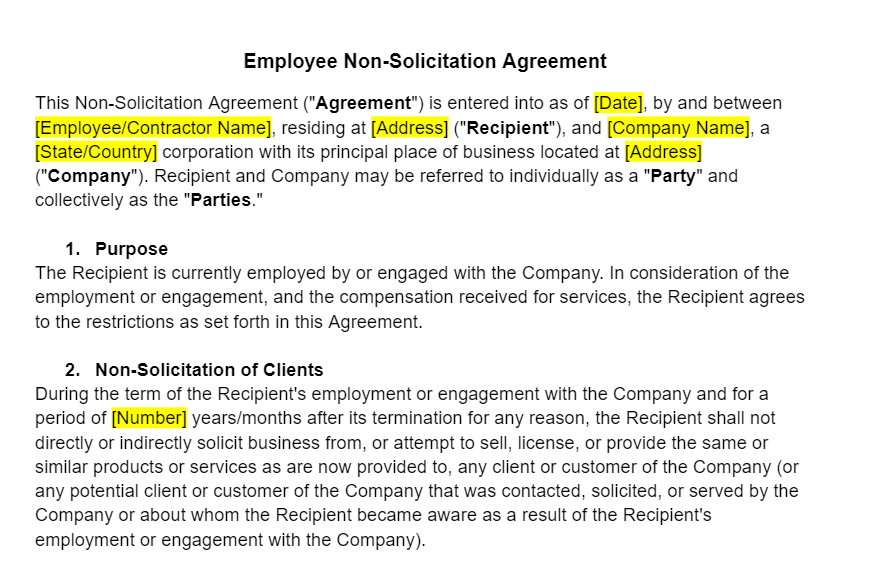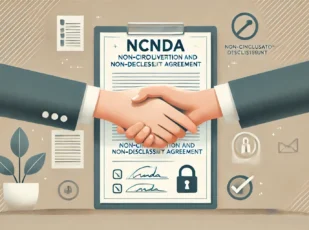
Non-Solicitation Agreement Template
6 Downloads
Employment
December 8, 2024
Sayantani Dutta
The search for talent and retaining the special individuals you find is one of the biggest challenges in HR. When it all goes right, and you find that exemplary employee, it’s great. You watch them add value to the business and establish themselves in the company. Then there’s that day when they walk into your office and tell you they’re giving their notice.
Sure, every great employee moves onto better things, and sometimes that’s not with your organization, and that’s okay. People need to grow, and you’re all for that.
Six months later, you’re wondering why three of your key accounts have jumped ship, and it turns out the employee poached them after leaving. Now, these top clients are giving their businesses to the competition.
What do you do? Your business is hemorrhaging money, and that’s going to affect your quarterly results. Your stockholders aren’t going to take that news very well.
This situation would never have happened if your hiring process included a non-solicitation agreement in the employment contract. The non-solicitation clause protects your business from instances just like this, where your employees feel they can poach your customers with no consequence.
There are also several together uses for this agreement, from protecting intellectual property to maintaining confidentiality. Let’s look into the paperwork that protects your business.
What is a Non-Solicitation Agreement?
So, how would a non-solicitation agreement benefit you in the situation we outlined? When your employees decide to run off to the competition with your proprietary information or trade secrets and customer list, how can you stop them, and what legal recourse do you have, if any?
A non-solicitation agreement is a legal contract prohibiting your employees from reaching out to your clients after they leave. The agreement can also restrict them from poaching other staff or vendors you work with.
What Terms are Included in the Non-Solicitation Agreement?
The non-solicitation contract has a set of terms and conditions the employee agrees to regarding their engagement with the business and industry after they leave their former employer. Typically, “non-solicitation” means the employee may not initiate contact between themselves and their former employers, current employees, clients, or suppliers. Essentially, they can’t contact anyone on their employer’s network with the intention of drumming up business for their own benefit.
The terms of the agreement also apply to the reverse scenario, when the client contacts the former employee and wants to work with them. Or a competitor company reaches out to the employee to headhunt them for a position at their firm. The employee can’t entertain these conversations as per the provisions of this agreement.
In some cases, the former employee may be privy to company secrets. In this case, a non-disclosure agreement prevents them from revealing anything they learn about the business, its operations, intellectual property, and trade secrets during their tenure at the company. Once again, this can be included as a clause in the non-solicitation agreement, but some employers may have stringent secrecy measures and require a separate document for adequate protection.
The non-solicitation agreement is considered a legally binding document enforceable in a court of law if it’s structured correctly. It states the former employee is prohibited from soliciting (reaching out to them in the hopes of doing business) the employer’s network. We can define the network as the former employer’s client list, employees, and service providers. They can’t build business relationships with people or companies they worked with during their tenure at their former company.
This document isn’t everlasting, except in very rare cases. So, the agreement must mention the timeline of these restrictions. It must mention how long they apply for after the employee leaves the company or receives notice of termination of employment. And when the restrictions end.
When Do You Use a Non-Solicitation Agreement?
The purpose of the entire agreement is to safeguard the business and protect it from financial or reputational damage inflicted by rogue employees entering and leaving the company. Non-solicitation clauses or agreements protect company interests, and HR teams include them in the contract of employment for independent contractors and in settlement agreements.
These agreements are useful for companies operating in competitive markets where company processes and trade secrets must be kept out of competitors hands. Since employees are the biggest failure point for leaks, it makes sense to prevent them from taking the information they learn on the job and selling it to the highest bidder.
The pharmaceutical industry is a good example. If Pfizer makes a new Ozempic clone, they don’t want the head of research and development on the project moving to Moderna, where they can use the information the former employee learned at their old job.
It’s common for non-solicitation clauses to appear in employment contracts for professionals working in the finance, IT, legal, professional services, and sales industries to have to sign non-solicitation agreements or clauses in their employment contracts.
What are the Two Types of Non-Solicitation Agreements
The non-competition clause in non-solicitation agreements prevents the departing employee from leveraging the employment relationship they built with the company over their tenure to build a competitor’s business. It also prevents them from opening a similar business and using the proprietary information they learned or took with them, such as their customer list.
It ties up the employee or independent contractor in terms of what they can do after they leave the company, forbidding them from contacting the company’s clients, vendors, employees, and the company’s business partners.
Let’s look at the two components of the non-solicitation clause or agreement in more detail.
Non-Solicitation Agreements for Employee and Vendor Protections
Finding great employees costs companies time and money. The costs of managing the hiring process, training new employees, and paying them make their employees one of the company’s biggest investments.
When an employee decides to walk away from the company, you don’t want them to take the investment you made in their training to the competition. Or even worse, they could use your proprietary networks to start their own business in the same sector and threaten your livelihood. With the amount of time and money you invest in building your team, if your former employees poach your staff, it’s like they’re stealing from you.
The non-solicitation agreement prevents this from happening. The employee can’t contact your employees under any circumstances outside of personal reasons. It also stops them from reaching out to your suppliers and vendors. Essentially, it prevents former employees from leveraging any of the internal or external business relationships they’ve built during their time with your company.
Non-Solicitation Agreements for Client Protections
Your employees are a huge investment, and you need to protect them. However, it’s also important to protect your client base from rogue employees. If the former employee decides to leave and open a company doing exactly what you do, all they need is your customer list and confidential information or intellectual property to be successful at putting you out of business.
The agreement outlines the former employee’s obligation to avoid contacting customers they’ve dealt with at their old company. If the former employee breaks the conditions in the non-solicitation agreement and uses their previous company’s network to impede their business relationship or value to an employer, they run the risk of their former employer taking legal action.
How Long is a Non-Solicitation Agreement Valid For?
The timeframe or term of this agreement or clause comes into effect from the moment the employee signs their employment contract and officially joins the firm. The employer will refer to their legal advisor on how to structure the agreement so it’s fair and legally enforceable. The attorney will structure the agreement in terms of the employer’s wishes and the laws of the state and federal employment legislation.
The average term of restrictions enforced by the non-solicitation agreement is around six months after the employee leaves the company. If the timeframe of restrictions detailed in the non-solicitation agreement is any longer than six months, it might dampen the employee’s career and future job prospects causing them financial difficulty.
If that’s the case, and the employee feels the restrictions are unfair, they can take the employer to court to argue their case. Typically, courts don’t like to enforce overly restrictive non-solicitation agreements and will rule in favor of the employee if they can present a good case.
Are Non-Solicitation Agreements Legally Enforceable?
It’s necessary to hire the services of an attorney to navigate the specifics of drafting the agreement and managing violations of the agreement or clause with legal follow-up. A lawyer knows how to use the judicial system to the company’s advantage with their understanding of the applicable law and legislation surrounding these agreements.
The attorney will have contacts at the Court of Competent Jurisdiction (a court or administrative agency in another state with legal authority to deal with specific subject matter). They understand the laws of the state and how they apply to these agreements to make them legally binding between parties. Speak to a lawyer if you’re out of reasonable options and the only path left is filing for injunctive relief.
Non-solicitation agreements and clauses are legal documents recognized by the courts and enforceable in the United States. That doesn’t mean the employee can’t challenge the agreement if they feel the terms are unfair and overly restrictive. An attorney can help you wade through the legality and enforceability of the document.
Keeping it concise and specific to their role gives the employer a stronger case in court hearings. You’re also going to need to consider the geographical area in the restrictive covenants for the agreement. It will be harder to enforce national restrictions on the employee’s operations than it is to restrict their activities within a 50-mile radius of your business.
Breach of Non-Solicitation Agreement or Clause
Your attorney can help you take the best approach to handling the situation. The issue with the non-solicitation agreement isn’t that it’s a legal document enforceable in a court of law. The problem is that there are no set legal criteria in state law or governing law outlining specific outcomes for violating the subject matter in the terms and conditions of the agreement.
Depending on the merits of the situation, the former employer might have the right to pursue a claim for monetary damages due to financial losses sustained by the company or a loss of reputation.
The Differences Between a Non-Compete Agreement and a Non-Solicitation Agreement
We’ve already talked about how a rogue employee can resign from your business and join a competitor, but what happens when they start a business that’s in direct competition with yours?
The non-solicitation agreement or clause stops the former employee from reaching out to their former employer’s client list or poaching other employees. The non-compete agreement or clause prevents them from starting a business that’s in direct competition with their former employer.
Indirect Vs. Direct Solicitation
Employers need to know the differences between indirect and direct solicitation and how they apply to the agreement or clause. When the former employee targets your client list directly, it’s direct solicitation. An example of this behavior is calling their old client list directly to let them know they’ve moved to the competition and want their business. The same applies to a scenario where the former employee solicits their former colleagues and asks them to join them at the competition or in their new company.
Indirect solicitation is more of a grey area and harder to define. It could involve a scenario where the former employee gets a management role at a competitor and gives their old client list to the sales team to prospect. It’s very hard to prove indirect solicitation, and companies will need legal advice if they want to pursue a case against a former employee they suspect of this behavior.
Download a Non-Solicitation Agreement Template from FreshDox.com
Don’t let your employees run off with your business secrets or poach your employees. Draft a water-tight non-solicitation agreement using a template from FreshDox.com. Customize the template with your corporate branding. Our templates meet industry standards for professional documents suitable for any business deal, legal proceeding, or educational requirement.
FreshDox.com offers a free 7-day trial of our platform for new users when you sign up for a Basic or Premium account, and there’s no obligation to subscribe. Let us show you the value we can add to your business and browse our catalog of professional, customizable templates for any transaction, business dealing, or corporate paperwork requirement.
Popular searches:
Related Templates
Discover more templates that align with your needs and preferences.

Ready to Sign Up?
Sign up for FreshDox.com’s 7-day trial and discover why so many individuals and businesses trust us for their legal document template needs.
- Cancel any time
- 7-day free trial
- From 300+ Customer Reviews
















